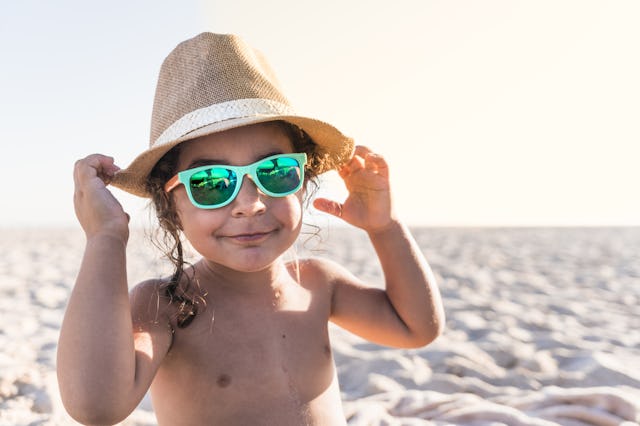PSA: Sunglasses Are Just As Important As Sunscreen For Your Kids
A new study found that less than a third of parents know that sun damage affects the eye health of their kids.

Parents have generally gotten the memo about sunscreen and child health. In fact, slathering on a big dose of sunscreen onto each and every exposed inch of their kids’ skin is part of most every mom’s daily summer routine. But when it comes to sunglasses, it turns out that the majority of parents see them as novelty items or fashion statements instead of what they are: vital protection for kids’ eyes that could affect their future vision.
A new survey from the University of Michigan that polled 2,002 parents of children ages 3-18 found that less than one-third knew wearing sunglasses when outdoors has a major impact on children's vision and eye health — and just two out of five have their children wear sunglasses when playing outside.
More: The 11 Best Sunglasses For Toddlers, According To An Expert
“It’s so important to wear sunglasses any time you’re outside, regardless of the weather or the season,” Dr. Dora Adamopoulos, a medical advisor to The Vision Council, a non-profit vision health organization, tells Scary Mommy. “Sunglasses are a daily health necessity to protect your eyes from long and short-term damage from the sun's UV rays.”
It helps that they look cool, too.
According to the Vision Council, kids receive three times as much UV exposure than adults do, and while parents are getting better at protecting their kids’ skin from that damage, kids’ eyes are often ignored or an afterthought — perhaps because UV damage to skin results in a painful sunburn, while UV damage to your eyes doesn’t usually have such immediate affects.
"While parents often make sure their children's skin is protected with sunscreen, they may not think about protecting their eyes from the sun as well," co-director of the poll, Sarah Clark, told Science Daily.
The Mayo Clinic warns that UV damages to kids’ eyes can lead to cataracts, age-related macular degeneration, and pterygium (a noncancerous growth of tissue on the surface of the eye) when they’re older. And in the short term, they could suffer photokeratitis (also known as snow blindness) which harms vision and feel like having a sun-burned eye.
While you probably see more adults wearing sunglasses than kids, kids actually have a bigger need for them when it comes to protecting their eyes.
“Children have larger pupil sizes which means there is a bigger window for UV to enter their eye,” explains Adamopoulos. “Since their internal lens is still developing, they can’t filter out UV as well as an adult eye.”
And it’s important to know that the cells in your lens are never replaced or replenished — they accumulate damage over the course of your life. You only get two. So teach your kid to treat them kindly.
How To Pick Out Sunglasses For Your Kid & How To Get Them To Wear Them!
When picking kids’ sunglasses, look for polarized glasses that provide UV protection above all else (there are lots of cheap novelty sunglasses for kids floating around — they don’t work). After that, remember that no-scratch, impact-resistant frames will fit with your kids’ rough-and-tumble lifestyle. Be aware that sunglass straps can help older kids keep track of their shades, but that they could be a choking hazard on younger kids.
More: The Best Baby Sunglasses
How can you get kids — especially younger toddlers or picky tweens — to wear sunglasses when you’re out and about this summer? First and foremost, let your kid pick their own pair (as long as they fit the above parameters for UV protection and safety). And with older kids, let them know the health benefits of donning shades. Another thing that helps? Make sure to wear sunglasses, too, to model the behavior.
If all else fails, eye experts say that a wide-brimmed hat also lends great eye protection, used with or without glasses.
This article was originally published on